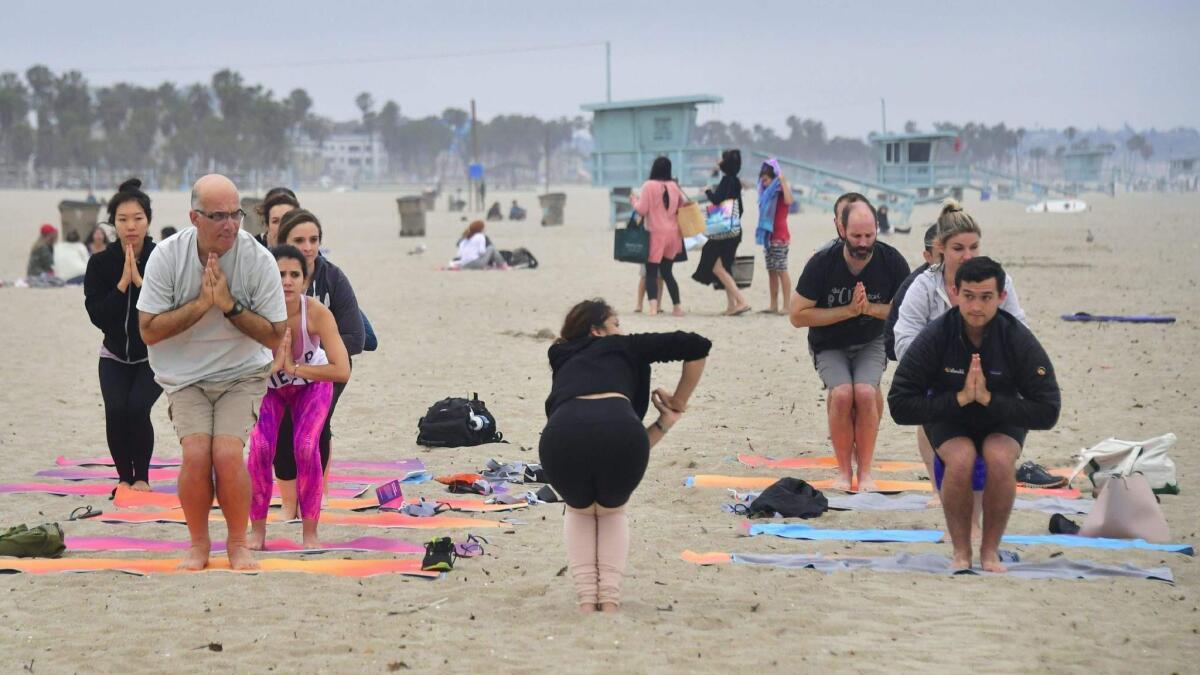Commentary: Mindfulness, yoga, meditation will help you exhale life’s anxieties

- Share via
You need to chill out. Seriously. Doctor’s orders.
Research has long established a link between anxiety and health issues as grave as cancer and heart disease. In today’s world, stressors are everywhere. But thankfully, so are the antidotes to stress.
From yoga studios in your local shopping center to mediation apps on your phone, there are no shortages of ways to decompress, de-stress and simply breathe. And it seems that more people are aware of the health benefits and necessity of meditation and mindfulness.
Still, the term “mindfulness” can elicit puzzled looks from people. What does it mean to be “mindful” and how exactly is mindfulness medically beneficial?
Western philosopher Jon Kabat-Zinn has a definition that I find helpful: “Mindfulness is awareness that arises through paying attention, on purpose, in the present moment, non-judgmentally.”
It isn’t as tricky as it sounds. There are guided meditation apps that can help you incorporate healthful meditation into your life every day, and yoga poses can be struck at home right after you wake up. And the effects these small changes can have on your health can be enormous.
Pain: In a study of 342 people who had experienced significant lower back pain for at least one year, 43% of people who attended a weekly mindfulness training session experienced a meaningful reduction in pain, versus 26% of people who maintained their usual pain treatment regimen.
Depression: A small, but sound study of adults suffering from major to moderate depression found that an eight-week Hatha yoga intervention resulted in statistically and clinically significant reductions in depression severity.
Memory and brain health: Harvard researchers discovered that meditating for 30 minutes every day for eight weeks actually increased gray matter in an area of the brain important for learning and memory.
If it still seems strange to focus on breathing as a complement to modern medicine, consider that how we breathe changes drastically over the course of our lives. When we are babies and toddlers, our breathing center is in our bellies. As we become adults, we begin breathing from our chests, resulting in less diaphragmatic breathing. When we are ill, we often experience shallow breath.
The healthier we are during the course of our lives, the slower and deeper our breathing.
By “relearning” how to breathe, we can reduce that “fight or flight” response that causes our bodies to go into stress overdrive. This can help us to better control our moods and our responses to stress.
When we experience anxiety, we breathe too quickly — essentially “using ourselves up” faster than we should. So, instead of worrying and scurrying, take your time. Breathe. Notice the world around you and stress a little less about your specific place in it.
In other words, chill out. Doctor’s orders.
Dr. Amit Hiteshi specializes in internal medicine with Hoag Medical Group
All the latest on Orange County from Orange County.
Get our free TimesOC newsletter.
You may occasionally receive promotional content from the Daily Pilot.



